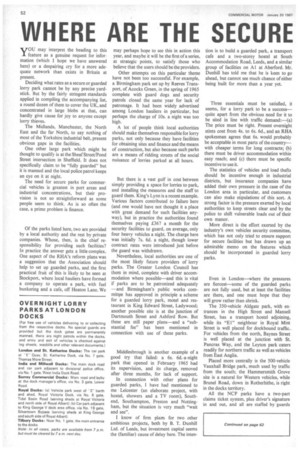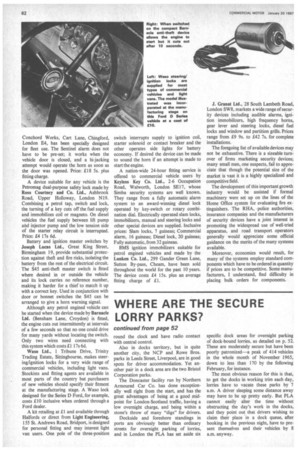WHERE ARE THE SECURE
Page 54

Page 64

If you've noticed an error in this article please click here to report it so we can fix it.
yOU may interpret the heading to this feature as a genuine request for information (which I hope we have answered here) or a despairing cry for a more adequate network than exists in Britain at present.
Deciding what rates as a secure or guarded lorry park cannot be by any precise yardstick. But by the fairly stringent standards applied in compiling the accompanying list, a round dozen of them to cover the UK, and concentrated in large blobs at that, can hardly give cause for joy to anyone except lorry thieves.
The Midlands, Manchester, the North East and the far North, to say nothing of most of the Yorkshire industrial belt, present obvious gaps in the facilities.
One other large park which might be thought to qualify is at the Sheaf Street/Pond Street intersection in Sheffield. It does not specifically claim to be "fully guarded" but it is manned and the local police patrol keeps an eye on it at night.
The need for secure parks for commercial vehicles is greatest in port areas and industrial concentrations, but their provision is not so straightforward as some people seem to think. As is so often the case, a prime problem is finance.
Of the parks listed here, two are provided by a local authority and the rest by private companies. Whose, then, is the chief responsibility for providing such facilities? In practice the answer gets a little complex. One aspect of the RHA's reform plans was a suggestion that the Association should help to set up guarded parks, and the first practical fruit of this is likely to be seen at Stockport, where local hauliers have formed a company to operate a park, with fuel bunkering and a cafe, off Heaton Lane. We may perhaps hope to see this in action this year, and maybe it will be the first of a series, at strategic points, to satisfy those who believe that the users should be the providers.
Other attempts on this particular theme have not been too successful. For example, a Birmingham park set up by Reeves Transport, of Acocks Green, in the spring of 1965 complete with guard dogs and security patrols closed the same year for lack of patronage. It had been widely advertised among London hauliers in particular, but perhaps the charge of 10s. a night was too high.
A lot of people think local authorities should make themselves responsible for lorry parks, not only because they have facilities for obtaining sites and finance and the means of construction, but also because such parks are a means of ridding streets of the social nuisance of lorries parked at all hours.
But there is a vast gulf in cost between simply providing a space for lorries to park, and installing the measures and the staff to guard them. King's Lynn is a recent example. Various factors contributed to failure here (and one would have not thought it a place with great demand for such facilities anyway), but in practice the authorities found themselves paying £367 a month for the security facilities to guard, on average, only four heavy vehicles a night. The charge here was initially 7s. 6d. a night, though lower contract rates were introduced just before the guard was withdrawn.
Nevertheless, local authorities are one of the most likely future providers of lorry parks. The Greater London Council has them in mind, complete with driver accommodation where possible—and this is vital if parks are to be patronized adequately —and Birmingham's public works committee has approved in principle a scheme for a guarded lorry park, motel and restaurant in King Edward Street, Ladywood; another possible site is at the junction of Dartmouth Street and Ashford Row. But these are still paper plans—and a "substantial fee" has been mentioned in connection with use of these parks.
Middlesbrough is another example of a good try that failed: a 6s. 6d.-a-night park that opened in February 1965 had its supervision, and its charge, removed after three months, for lack of support.
In connection with other plans for guarded. parks, I have had mentioned to me Leicester (an elaborate project, with hostel, showers and a TV room), Southend, Southampton, Preston and Nottingham, but the situation is very much "wait and see".
I know of firm plans for two other ambitious projects, both by B. T. Dunhill Ltd. of Leeds, but investment capital seems the (familiar) cause of delay here. The inten
don is to build a guarded park, a transport cafe and a two-storey hostel at South Accommodation Road, Leeds, and a similar group of facilities on Al at Aberford. Mr. Dunhill has told me that he is keen to go ahead, but cannot see much chance of either being built for more than a year yet.
Three essentials must be satisfied, it seems, for a lorry park to be a success— quite apart from the obvious need for it to be sited in line with traffic demand:—(a) The price must be right. Present overnight stints cost from 4s. to 6s. 6d., and an RHA spokesman agrees that 6s. would probably be acceptable in most parts of the country— with cheaper terms for long contracts; (b) there must be driver accommodation within easy reach; and (c) there must be specific incentive to use it.
The statistics of vehicles and load thefts should be incentive enough in industrial districts, but insurance companies have added their own pressure in the case of the London area in particular, and customers can also make stipulations of this sort. A strong factor is the pressure exerted by local authorities to keep streets clear and by the police to shift vulnerable loads out of their own manor.
More direct is the effort exerted by the industry's own vehicles security committee, which has not only tried to ensure support for secure facilities but has drawn up an admirable memo on the features which should be incorporated in guarded lorry parks.
Even in London—where the pressures are fiercest—some of the guarded parks are not fully used, but at least the facilities are there, and one must hope that they will grow rather than shrink.
The 350-vehicle Aldgate park, with entrances in the High Street and Mansell Street, has a transport hostel adjoining, while its "El" neighbour in Royal Mint Street is well placed for dockbound traffic. For vehicles from the north, Baynes Street is well placed at the junction with St. Pancras Way, and the Leyton park caters readily for northern traffic as well as vehicles from East Anglia.
Placed more centrally is the 500-vehicle Vauxhall Bridge park, much used by traffic from the south; the Hammersmith Grove site is a natural for Western vehicles, while Brunel Road, down in Rotherhithe, is right in the docks territory.
All the NCP parks have a two-part claims ticket system, plus driver's signature in and out, and all are staffed by guards Conchord Works, Cart Lane, Chingford, London E4, has been specially designed for fleet use. The Sentinel alarm does not have to be pre-set; it works when the vehicle door is closed, and a hi-jacking attempt would operate the horn as soon as the door was opened. Price: £18 5s. plus fitting charge.
A device suitable for any vehicle is the Petromag dual-purpose safety lock made by Ross Courtney and Co. Ltd., Ashbrook Road, Upper Holloway, London N19. Combining a petrol tap, switch and lock, the turning of a key cuts off the fuel supply and immobilizes coil or magneto. On diesel vehicles the fuel supply between lift pump and injector pump and the low tension side of the starter relay circuit is interrupted. Price: £4 17s 6d.
Battery and ignition master switches by Joseph Lucas Ltd., Great King Street, Birmingham 19, provide substantial protection against theft and fire risks, isolating the battery from the rest of the electrical circuit. The 545 anti-theft master switch is fitted where desired in or outside the vehicle and its lock carries no reference number, making it harder for a thief to match it up with a correct key. Used in conjunction with door or bonnet switches the S45 can be arranged to give a horn warning signal.
Although any petrol engined vehicle can be started when the device made by Barnacle Ltd. (Bensham Lane, Croydon) is fitted, the engine cuts out intermittently at intervals of a few seconds so that no one could drive for many yards without locating the switch. Only two wires need connecting with this system which costs £1 17s 6d.
Waso Ltd., 1 Tribune Drive, Trinity Trading Estate, Sittingbourne, makes steering/ignition locks for a very wide range of cominercial vehicles, including light vans. Stockists and fitting agents are available in most parts of the country but purchasers of new vehicles should specify their fitment at the manufacturing stage. A Waso lock designed for the Series D Ford, for example, costs £10 inclusive when ordered through a Ford dealer.
A kit retailing at £1 and available through Halfords or direct from Light Engineering, 155 St. Andrews Road, Bridport, is designed for personal fitting and may interest light van users. One pole of the three-position switch interrupts supply to ignition coil, starter solenoid or contact breaker and the other operates side lights for battery economy. If desired the device can be made to sound the horn if an attempt is made to start the engine.
A nation-wide 24-hour fitting service is offered to commercial vehicle users by Keyless Key Co. Ltd., 2-6 Occupation Road, Walworth, London SE17, whose Simba security systems are well known. They range from a fully automatic alarm system to an award-winning diesel lock operated by key-switch or rotary combination dial. Electrically operated slam locks, immobilizers, manual and steering locks and other special devices are supplied. Inclusive prices: Slam locks, 7 guineas; Commercial alarm, 16 guineas; Diesel lock, 20 guineas; Fully automatic, from 32 guineas.
BMS ignition immobilizers suitable for petrol engined vehicles and made by the Lunken Co. Ltd., 299 Gander Green Lane, Sutton By-pass, Cheam, have been sold throughout the world for the past 10 years. The device costs £4 15s. plus an average fitting charge of £1. J. Granat Ltd., 28 South Lambeth Road, London SW8, markets a wide range of security devices including audible alarms, ignition immobilizers, high frequency horns, gear lever and steering locks, diesel fuel locks and window and partition grills. Prices range from £9 9s. to £42 7s. for complete installations.
The foregoing list of available devices may not be exhaustive. There is a sizeable turnover of firms marketing security devices; many small men, one suspects, fail to appreciate that though the potential size of the market is vast it is a highly specialized and competitive field.
The development of this important growth industry would be assisted if formal machinery were set up on the lines of the Home Office system for evaluating fire extinguishers. The RHA, police authorities, insurance companies and the manufacturers of security devices have a joint interest in promoting the widespread use of well-tried apparatus, and road transport operators generally would appreciate some official guidance on the merits of the many systems available.
Moreover, economies would result, for many of the systems employ standard components which have to be ordered in quantity if prices are to be competitive. Some manufacturers, I understand, find difficulty in placing bulk orders for components.




























































































































